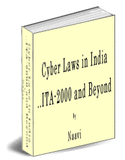E-Governance is a huge IT opportunity area in India and elsewhere. There have been many IT initiatives both at the State levels and the Central level in India for E-Governance projects that provide a transparent efficient public service which is user friendly and economical.
One of the main objectives of such projects is "Reduction in Cost of Administration". However, in practice, it is often found that the cost of IT solution implementation often exceeds original estimations for several reasons. One such reason is that often the decision making process in the Government sector tends to favour investment heavy solutions. Often the budgeted cost is eaten up in the hard ware set up only and there is a heavy cost compromise in software and content related expenditure and little or nil expenditure in educating or training the potential users of the system in making good use of the project. This reduces the overall efficiency of the system and makes it cost inefficient in the long run.
Smart E-Governance should be Solution Oriented
Naavi believes that "Smart E-Governance" is one where maximum benefits are transferred to the system at least cost. This requires higher allocation of budget for the objectives of user education as well as content and software than what is being done now.
Admitting that the total available budget for any E-Governance project is limited, a "Smart E-Governance Implementation" has to chose such technologies that would release more funds for non hardware uses from an allocated budget.
Where alternatives are available, the solution which has a low component of investment in hardware needs to be preferred if the quality of solution provided by both alternatives are same.
Tendering System Needs to be Reviewed
There appears to be a fundamental stumbling block to such a decision making since the present tendering systems adopted by the E-Governance projects are often specified in such a manner that instead of a common objective being specified for the project, detailed hardware and software specifications are provided which leaves little scope for innovative solutions to be offered.
The Government tendering system should therefore specify the end objective and leave the hardware-software requirements flexible. Wherever possible the tender should provide for outsourced solutions so that the system costs become irrelevant to the decision making.
Since this approach is a departure from the existing tendering systems it requires a strong leader to push it through the bureaucratic system. In the current scenario it appears that only Tamil Nadu and AP have the capability for such experimentation.
Partnership in Promoting Smart E-Governance Solutions
In promoting the need for such "Smart E-Governance" along with specific solutions, Naavi is looking for the assistance of likeminded IT Companies.
Needless to say that the commercial opportunities justify a focussed attention on this niche market even by large IT companies who do not look at projects of less than a few crores in value.
Interested Persons/Companies may contact Naavi for more information
Naavi
September 30,2003
Related Articles:
Smart Cards and Their Limitations
Smart Cards for Citizen ID..Let's Not Build Castles in the Air
For Structured Online Courses in Cyber laws, Visit Cyber Law College.com
